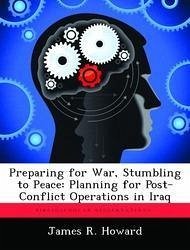This monograph discusses planning for the post-conflict phase of Operation IRAQI FREEDOM. More specifically, it examines whether a disparate focus on war-fighting operations during the planning and execution phase of Operation IRAQI FREEDOM is to blame for the lack of progress towards reconstruction. It examines the factors and influences that led political and military leaders to make certain decisions during the preparatory and combat phases of operations to depose Saddam Hussein. Moreover, it asks whether military leaders could have acted differently in pursuit of the Bush Administration's strategic objectives for Iraq. The purpose of this paper is to assess whether planning for Operation IRAQI FREEDOM devoted sufficient attention to the likely requirements of the post-conflict environment. It will analyze whether the failure to plan for this environment exposed realization of the strategic objectives to unnecessary risk. The hypothesis is that the challenges post-conflict Iraq poses to the coalition result, in part, from the failure to anticipate, collaborate and prepare. Could the likely challenges of post-Saddam Iraq have been anticipated? Did government departments and experts collaborate internally and externally to mitigate these challenges? Finally, did political and military leaders prepare thoroughly to meet the ordeals of the post-conflict environment? These three aspects are the criteria against which the performance of the United States Army during the planning and execution of Operation IRAQI FREEDOM are measured. They are drawn from Eliot A. Cohen and John Gooch 's book Military Misfortunes: The Anatomy of Failure in War. The measure of the United States'; Army's performance against the criteria involves an assessment of the effects of senior leaders'; mental models, and the effects of groupthink. Analysis also examines the degree to which American military culture is appropriate for the likely missions and tasks, such as nation building, that may








